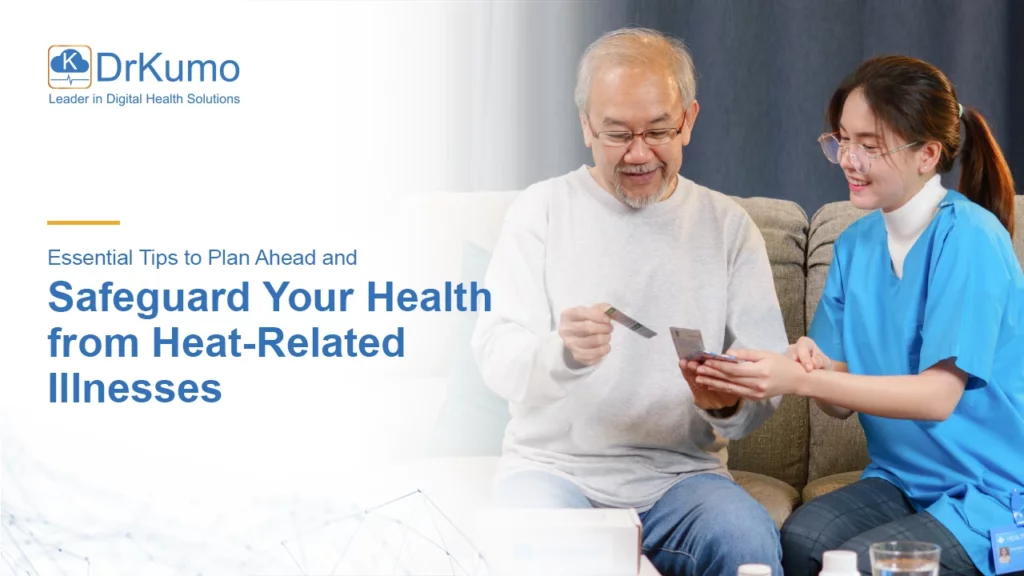When outside temperatures rise during the Summer months, the frequency and intensity of heatwaves increase, posing significant health risks. For individuals managing chronic conditions, the stakes are even higher. Effective chronic care management becomes crucial in these extreme conditions, as heat-related illnesses can exacerbate existing health issues. Planning ahead and adopting proactive strategies are key to protecting your health.
This blog offers essential tips on how to safeguard your well-being, manage chronic conditions, and ensure you’re prepared for the challenges that come with rising temperatures.
1. Prepare with Smart Health Management Strategies
According to the World Health Organization, extreme heat events can significantly impact individuals with chronic conditions, increasing their risk of heat-related complications. The WHO highlights that during heatwaves, people with pre-existing health issues are more vulnerable to adverse effects, including exacerbated symptoms and increased hospitalizations.
Proper preparation involves understanding these risks and adjusting management guidelines accordingly. Consulting with your healthcare provider to revise medical and treatment protocols is crucial for maintaining effective chronic care management during extreme temperatures. This proactive approach helps ensure that your condition remains under control, even in challenging heat conditions.
2. Follow Tailored Medical Protocols for Heatwaves
If you’re living with a chronic condition, adhering to medical guidelines is critical.
Key components to include in your plan:
Incorporate Heat-Related Treatment Protocols
- Adjust Medications: Modify medications as advised by your healthcare provider to prevent heat-related complications.
- Increase Hydration: Follow guidelines for fluid intake to avoid dehydration during heatwaves.
Follow Chronic Condition Protocols
- Tailored Management: Implement specific strategies to manage your chronic condition effectively in extreme heat conditions.
- Regular Monitoring: Keep track of your health metrics and adjust your care plan as necessary.
Ensure effective health management
This personalized approach helps in managing heat-related issues and maintaining optimal health throughout heat events.
3. Monitor and Adjust Chronic Care Management Plans
Staying ahead of heat-related risks requires consistent monitoring and updates to your CCM strategy. Review your health guidelines regularly and keep in touch with your healthcare provider to tweak patient care protocols. Adapting disease care practices to suit weather conditions is a key ingredient to achieve better outcomes.
4. Implement Effective Patient Care Practices
Incorporate health management practices that prioritize hydration, cooling techniques, and balanced nutrition. These elements play a vital role in preventing heat-related complications. Align your routine with both your disease care needs and the recommended healthcare management strategies.
| Routine Aspect | Disease Care Needs | Recommended Healthcare Management Strategies | Benefits |
|---|---|---|---|
| Daily Health Monitoring |
|
|
|
| Medication Management |
|
|
|
| Exercise and Physical Activity |
|
|
|
| Diet and Nutrition |
|
|
|
| Emergency Preparedness |
|
|
|
5. Stay Informed and Prepared with Up-to-Date Medical Guidelines
Stay informed: Keep up with health guidelines
As temperatures soar, staying informed is essential. Regularly check for updated health guidelines and make necessary adjustments to your care plan.
Adapt your care plan: Ensure ongoing effectiveness
This ensures that your chronic condition management remains effective in varying conditions. Adjustments to your care plan help you stay on top of your health needs.
Takeaways
Surviving the heat with a chronic condition doesn’t have to be overwhelming. You can confidently face even the most intense heatwaves by embracing tailored chronic care management strategies, sticking to proven medical protocols, and staying proactive in your self-care. Remember, preparation is key—stay cool, stay informed, and let smart planning be your strongest ally in protecting your health when temperatures soar.
Contact DrKumo today to learn more about how our Remote Patient Monitoring solutions can help you stay safe and manage your health effectively during heatwaves. Let’s tackle the heat together, ensuring your well-being remains a top priority, no matter the temperature.
Disclaimer: This article is for informational purposes only and should not be considered medical advice. Always consult with a healthcare professional before making any changes to your treatment plan, especially during extreme heat conditions. While proactive health management is essential, it is not a substitute for professional medical care. In case of an emergency, seek immediate medical assistance. Always follow the advice of your healthcare provider and adhere to relevant medical guidelines to ensure your safety.









